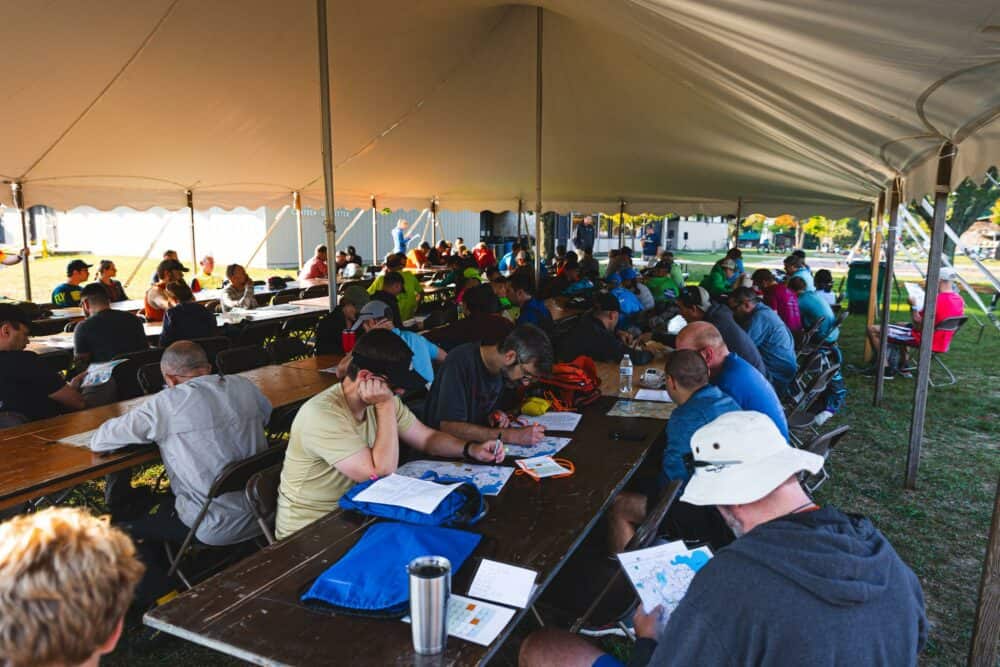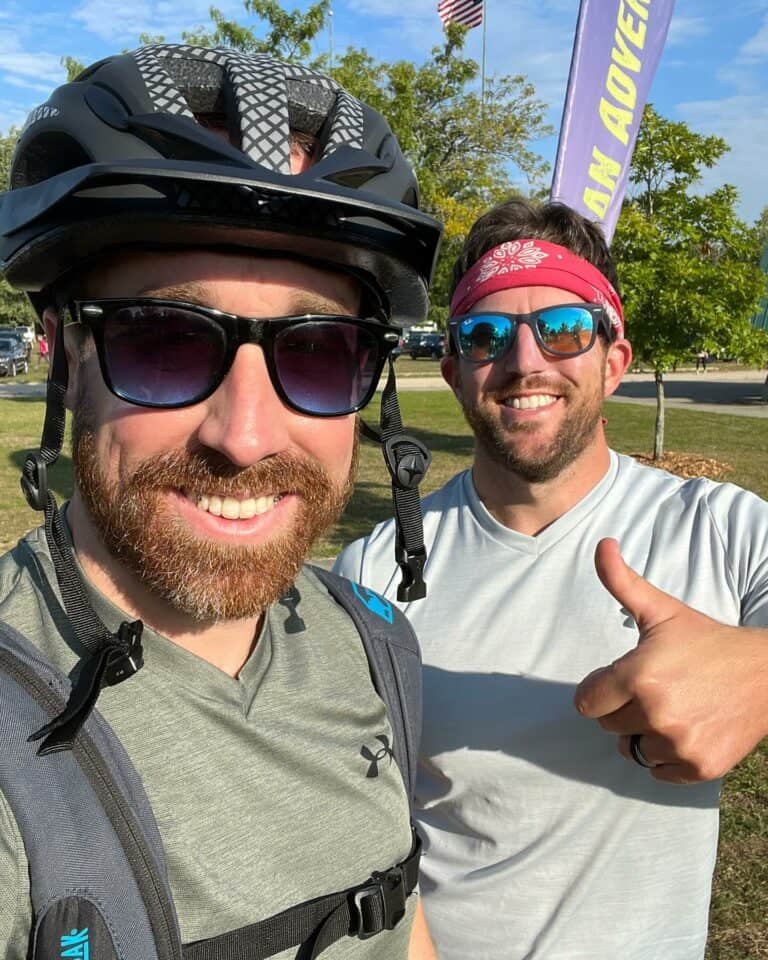In early September, my good friend (also named Josh) and I embarked on our inaugural Adventure Race in Northern Michigan. At BizStream, we champion the motto that “it’s good to do hard things,” so naturally, we wanted to see what all the fuss was about. It did not disappoint!
The race encompassed a combination of trekking, canoeing, and mountain biking, demanding a fusion of strategic planning, stress management, and determination, all within the framework of light-hearted competition. The experience mirrored the dynamics of initiating a new project at BizStream in many ways.
Reflecting on this day, I’ve distilled several key insights that have enriched my perspective and honed my skills as a Project Manager.
At the start of the race, participants are provided with a map pinpointing various checkpoints. In our case, the challenge involved navigating 18 checkpoints scattered across a 5-mile radius, all within a stringent 5-hour time limit. This is about the point when your heart starts beating a little faster, and the nerves start to kick in. What did I get myself into?
When you spin up a new project, the same set of emotions can oftentimes run parallel. Nothing works more effectively at triggering a full-blown panic attack than a fresh backlog with 400 User Stories and an aggressive deadline.
Stay calm. You got this.
The initial step is meticulous planning, mapping out each phase of the project, similar to plotting a course from one checkpoint to the next. Opt for a path that harmonizes efficiency with productivity.
It’s a marathon, not a sprint. Just as the human body is not designed for a 5-hour sprint, a team cannot operate at maximum capacity out of the gate to the end. Focus on completing the initial sprint effectively, refining the process as needed, and then advancing with the knowledge gained.

Throughout my career, I have read numerous books and blogs penned by “seasoned Project Managers.” Indeed, knowledge is a power in a way, but it’s equally important to trust your own intuition.
During the race, we faced decisions on how to approach each segment (Trek, Canoe, Bike) and the order in which to tackle them. Initially, we contemplated starting with the trek, given its challenging checkpoints, which could potentially offer us a late-game advantage. This was what our gut was telling us. However, swayed by the majority, we opted to begin with biking, as it seemed to be the popular choice among other teams. We followed the herd.
I learned that when all 36 teams are simultaneously bike-sprinting through the forest, it can lead to some pretty nasty bottlenecks. We ran into a lot of other people fighting for the same checkpoints. It may have looked like the path of least resistance, but it wasn’t necessarily what was best for our race strategy. This parallels project management, where choosing the easiest tasks or the most apparent route isn’t always the most effective strategy. Tackling significant features early on can efficiently address dependencies, making future sprints much easier.
At one point in our race, we inadvertently started following another canoe. Little did we know that this particular canoe was a part of the 8-hour racing team (a completely different race), and they were headed toward a checkpoint that was not even on our map. This mistake, which cost us about 9 minutes as we struggled against the current to backtrack, underscored the importance of trusting our intuition rather than blindly following others. Trust your gut.

We had a considerable lead on the other teams as we entered the race’s final leg: the trek. We hit the trail at a sprint, victory within grasp. Our hope was that we would see the flag from the trail (it looked that way on the map, anyway). Unfortunately, that wasn’t the case. We didn’t pick a great starting point and neglected to get a proper bearing from our first position. Relying on hope rather than strategy, we missed the crucial first checkpoint and found ourselves retracing our steps back to the start. After losing 15 minutes, we made the decision to forgo that first checkpoint and return to it later. This choice was a testament to our ability to prioritize and manage time effectively, opting to cut our losses rather than persist in a fruitless search.
This experience draws a parallel to project management, particularly in the initial stages. Establishing a strong foundation for your first project sprint is crucial. It’s essential to carefully consider which tasks to undertake first to set the stage for future success. The eagerness to dive into the work is understandable, but the pre-production phase, in my opinion, determines the project’s ultimate success. It lays the groundwork for everything that follows, so it’s imperative not to overlook this planning phase.
Raw skills will only get you so far. This goes for both you and your team. Relying solely on a team of top-tier senior developers, often regarded as ‘rock stars’ in the tech world, is a misconception that can actually complicate matters for a Project Manager.
Both Josh and I workout pretty consistently (yay, CrossFit), and while our fitness level was certainly an asset, it occasionally proved to be a double-edged sword. We found ourselves over-relying on our physical strength and stamina, mistakenly believing it to be our ace in the hole. However, stamina is futile without direction, and even your greatest strengths can become liabilities if you lack a strategic plan.
In a race that requires both speed and endurance and strategic, educated, and coordinated moves, brute force alone is insufficient. Adventure Racing, much like complex projects, demands a slower, more thoughtful approach. It’s crucial to utilize a blend of skills, not just technical prowess.
This lesson is particularly pertinent in project management. Even the most seasoned developers can falter by overcomplicating or under-delivering solutions in the absence of a well-thought-out plan. Thus, it’s imperative to take the time to plan and rely on more than just technical skills to navigate a project successfully.
Did you count the total time wasted based on our mistakes? It was 24 minutes. The hard-to-swallow realization is the narrow margin by which we missed a podium finish; we were a mere 12 minutes shy of landing a top-three position. Any one of those mistakes could have been the difference between victory and our actual placement of 5th. I had a blast, don’t get me wrong. However, the thought lingers: with just a bit more experience, a deeper understanding of the race dynamics, and perhaps a more strategic approach, we could have secured a top-three placement.
So remember:

The advice from a seasoned 1st Assistant Director during my time in the film industry left a lasting impression: the importance of making a strong impression in the last week of work. This period is crucial as it tends to be what people remember and can significantly influence future opportunities. “Don’t screw up that last week,” he cautioned, “it determines if you land that next gig or not.”
This concept resonates deeply in project management as well. Often, the successes achieved during a project’s initial and middle stages are overshadowed if the final phase is mishandled. A project that is 90% successful but falters during launch is often perceived as a failure. The final moments, particularly any missteps, tend to linger in the customers’ memories, overshadowing earlier achievements. This unfortunate emphasis on the endgame can sometimes lead to the team not fully appreciating or celebrating the project’s completion as they should.
Recognizing and celebrating each victory along the way is essential. If a sprint is successful, it should be acknowledged and celebrated. Simple gestures like encouragement, praise, or team lunches can significantly impact morale. At BizStream, for instance, we use Officevibe to express gratitude and recognize the team’s hard work. While keeping an eye on the overall project goals, it’s also vital to appreciate and commend the team’s efforts in real time. This balanced approach ensures morale remains high and the team feels valued throughout the project lifecycle, not just at the end.

We love to make cool things with cool people. Have a project you’d like to collaborate on? Let’s chat!
Stay up to date on what BizStream is doing and keep in the loop on the latest in marketing & technology.